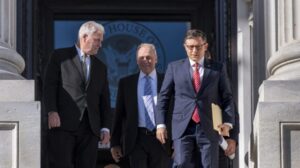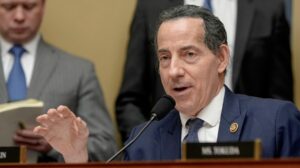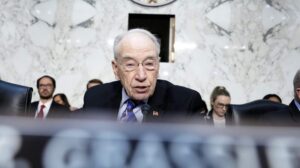Congress
Gabbard nomination heads to Senate floor
The Senate Intelligence Committee approved Tulsi Gabbard for director of national intelligence in a private vote Tuesday, sending her to the full Senate floor for consideration.
While the panel vote represented a major hurdle, her confirmation by the full Senate still isn’t certain. She can only afford to lose three Republican votes, if all Democrats vote against her, as expected.
Some Republicans on the committee — including Sens. James Lankford (R-Okla.) and Todd Young (R-Ind.) — had concerns over Gabbard after she declined to call Edward Snowden a traitor, despite multiple opportunities to do so in her confirmation hearing last week. Those senators, as well as Susan Collins (R-Maine) all indicated in the past 24 hours that they would back her.
But there are still some senators outside of the committee who haven’t indicated how they plan to vote. Sen. John Curtis (R-Utah) released a statement expressing concerns about the former lawmaker after her hearing. Sens. Lisa Murkoswki of Alaska and Mitch McConnell of Kentucky also haven’t indicated if they plan to back her, and both broke with their party to oppose Pete Hegseth confirmation as Defense secretary.
In her confirmation hearing, she failed to quell some GOP concerns about her positions on critical intelligence issues. She offered wishy-washy answers about a key foreign surveillance law she only recently said she supported.
And after a barrage of criticism over her failure to call Snowden — the former NSA contractor who leaked highly classified information about surveillance programs — a traitor, she wrote in an op-ed this weekend explaining that she avoided that label because treason is a capital offense that carries the death penalty.
Congress
Shutdown anxiety rises on Capitol Hill amid Trump chaos
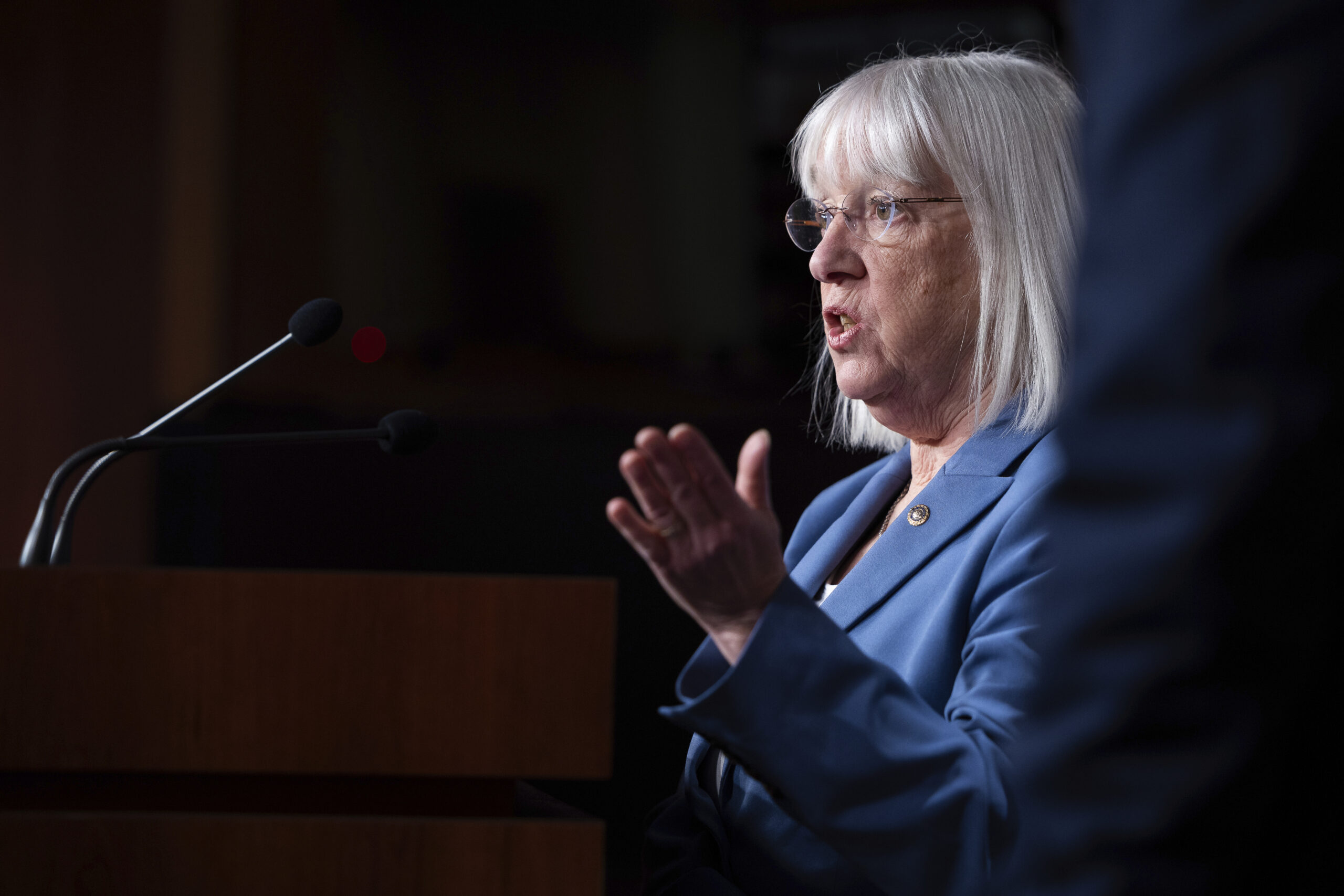
The president in charge during the longest government shutdown in U.S. history has returned to the White House, current government funding expires in less than six weeks — and on Capitol Hill, people are nervous.
It’s not just President Donald Trump’s history of leading the country through a 35-day funding lapse that has lawmakers worried about his appetite for another one in March. It’s also that Trump’s actions in his first two weeks back in office are stifling bipartisan negotiations toward a funding deal as the president — and his “government efficiency” chief, Elon Musk — work to bulldoze the federal bureaucracy while freezing billions of dollars Congress already enacted and firing federal workers.
“I don’t think anybody thinks a shutdown is a good thing. But the politics are such that we could certainly stumble into one without meaning to,” House Appropriations Chair Tom Cole, an Oklahoma Republican, said in a brief interview Tuesday.
The new president’s truculent first days in office have created an especially unfavorable climate on Capitol Hill for landing any cross-party accord, whether that’s a “grand funding deal” ahead of the government shutdown deadline or an agreement to lift the debt limit to prevent the U.S. from defaulting on more than $36 trillion in loans in the coming months.
While the Democratic leader in the House demands that Trump’s funding freeze be “choked off” as part of any funding agreement, Republican lawmakers say it will be Democrats who take the fall for causing a funding lapse if they hold that line. And so the shutdown blame game begins again.
“The president issued an executive order to curb spending. I highly doubt Republicans are going to rescind that. I don’t see that happening,” Rep. Lisa McClain (R-Mich.), the chair of the House Republican Conference, said late Tuesday. “That’s on Dems if they want to shut it down.”
Behind closed doors, Cole and Congress’ other three top appropriations are trying to strike a bipartisan deal on the first step toward funding the government by the March 14 deadline: One overall spending total for the military and another for non-defense programs. From there, it usually takes at least a month to negotiate and finalize the dozen individual funding bills. The clock is ticking fast.
The exasperated Democrats sitting opposite Cole at the negotiating table say any good faith agreement with their GOP counterparts is meaningless if Trump disregards the will of Congress by using “impoundment” to withhold funding they pass into law.
“If the White House is not going to honor an agreement and use impoundment, then it is hard to come to agreement,” Washington Sen. Patty Murray, the Senate’s top Democratic appropriator, said in a brief interview Tuesday.
Democrats want Trump to unfreeze foreign aid and billions of dollars already promised to federal contractors and local governments, while also stopping Musk from dismantling agencies like the U.S. Agency for International Development. They also want Trump to promise he will sign into law — and then actually follow — whatever bipartisan funding deal they might strike in the coming weeks, especially after he and Musk goaded GOP leaders into disavowing the December spending package all parties had previously approved.
“We need assurances. That’s all I’m going to say,” Murray said.
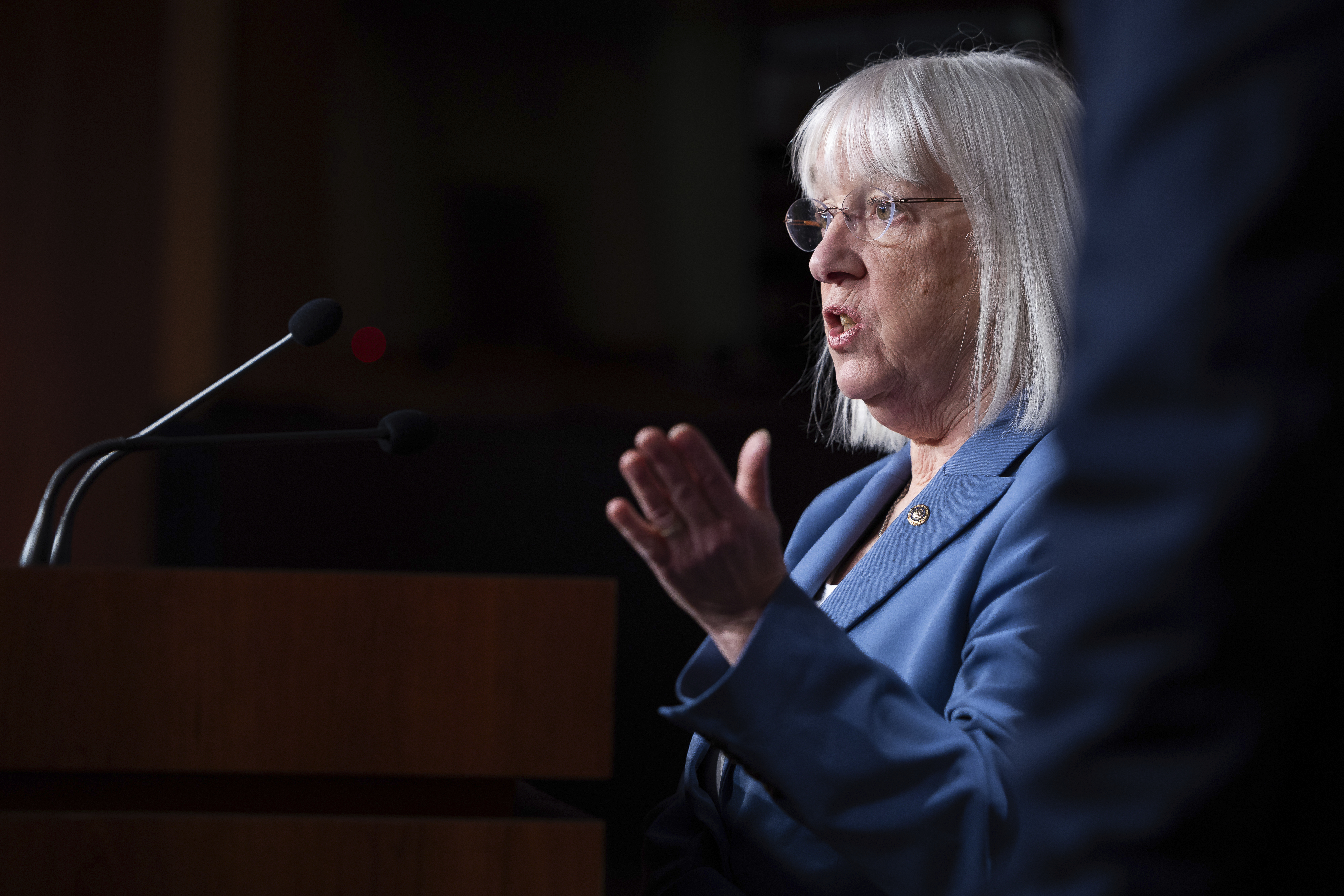
Congress’ four funding leaders — Murray and Cole, along with Senate Appropriations Chair Susan Collins and the House’s top Democratic appropriator, Rep. Rosa DeLauro of Connecticut — all praised each other’s efforts.
“Everybody in the room of goodwill, wanted to move forward” is how DeLauro described the ongoing funding negotiations between the so-called “four corners.”
But DeLauro is also wary. “Don’t tell me that all bets are off. That we’re going to come to a deal … and then all of a sudden Elon Musk or some other self-subscribed unchecked billionaire decides it’s not to his liking. Hell no.”
Trump already learned lessons on the toll of a government shutdown in late 2018 and early 2019, when funding to parts of the federal government lapsed for five weeks while he faced off with Democrats in Congress over funding for the border wall. It was a fight Trump ended up losing.
“I actually don’t think Donald Trump — having been through it — I don’t think he found it rewarding,” Sen. Kevin Cramer said Tuesday. “So I think he’s pretty serious about getting something done.”
The North Dakota Republican also noted the other main factor at play: the current fury of lawmakers in the minority party who have the power to tank a funding bill they don’t like given the narrow GOP majorities in both chambers. In the House, especially, are a number of fiscal conservatives who never vote for funding bills, no matter what. It means any funding bill will require Democratic support to pass.
“God, I hope that doesn’t happen. I mean, I really don’t,” Cramer said of the prospects of a government shutdown in March. “The Democrats aren’t in much of a mood to help.”
If top lawmakers can’t come to an agreement to keep the government funded, or if Trump bucks that deal, the new president would have some control over what federal efforts would continue beyond the March 14 deadline.
Trying to stem some of the public impact of the partial government shutdown in 2019, his administration tapped into park entrance fees to keep national parks open, a move federal watchdogs found in violation of the law. With Musk empowered now to compel entire government offices to shed staff or shutter entirely, the stakes are higher for what a federal funding lapse could entail this time around.
The effects are also, generally speaking, more difficult to quell the longer a government shutdown lasts, as benefit payments like SNAP food assistance are eventually withheld.
“These things get worse and worse and worse the longer they go on,” said Bobby Kogan, who served during the Biden administration as adviser to the White House budget director.
Kogan, who now works for the liberal Center for American Progress, said he is “skeptical of the idea that Trump will deliberately shut us down as another way to stop spending, because shutdowns are deeply unpopular.”
But Trump’s funding freeze and unwillingness to abide by funding caps enacted two years ago under then-Speaker Kevin McCarthy and President Joe Biden create a “real risk.”
Katherine Tully-McManus contributed to this report.
Congress
Trump’s plan to ‘take over’ Gaza Strip confuses GOP lawmakers
President Donald Trump’s vague vow that the United States will “take over the Gaza Strip” is sparking quick pushback, and confusion, among some of his key allies in the Senate GOP.
Trump provided no details during a press conference on Tuesday with Israeli Prime Minister Benjamin Netanyahu about how the United States would acquire the land, but said that the United States will “own it and be responsible.” Many lawmakers were learning about the remarks in real time as they headed to a vote on confirming Pam Bondi for attorney general Tuesday night.
“There’s probably a couple of kinks in that slinky,” Sen. Thom Tillis (R-N.C.) said after a reporter described the rough parameters of what Trump had said.
Another GOP senator, granted anonymity to give his candid reaction to Trump’s comments, was equally direct: “I did not have this on my bingo card. … I got so many questions.”
Senate Majority Leader John Thune said in a brief interview that he hadn’t seen the statement, but that “I think we’re obviously all interested in facilitating a solution to the Middle East, particularly with the whole situation in Gaza.”
“How we best achieve that I think is still — it’s a subject of conversation, sounds like he’s got an idea on that,” he added.
It’s the latest in a growing list of examples of Trump catching congressional Republicans off guard with his actions or rhetoric — a call back to his first administration when GOP lawmakers frequently claimed they hadn’t seen Trump’s latest tweet or comment.
Senate Foreign Relations Chair Jim Risch (R-Idaho) said he had not heard Trump’s remarks and so “I don’t want to comment.” Sen. John Cornyn (R-Texas) said that “I don’t really know what to make of that” and joked that reporters should check back with him on Wednesday.
Other allies tried to walk a careful line between not shutting the door to Trump but also signaling their skepticism about taking over the Gaza Strip.
“We’ll see what our Arab friends say about that. I think most South Carolinians would probably not be excited about sending Americans to take over Gaza. I think that might be problematic, but I’ll keep an open mind,” said Sen. Lindsey Graham (R-S.C.).
Asked about sending U.S. troops, he added that Gaza “would be a tough place to be stationed as an American.”
Sen. John Hoeven (R-N.D.), who noted he still had to take a look at the comments, said Trump might be doing this as a negotiating tactic. He added that maybe the president is trying to “force a resolution” on a “very difficult issue.”
“I don’t know that I think it’s the best use of United States resources to spend a bunch of money in Gaza, I think maybe I’d prefer that to be spent in the United States first,” Sen. Josh Hawley said. “But let’s see what happens.”
When asked if he thought sending US troops to Gaza was the right solution, the Missouri Republican said he did not.
While Democrats were largely critical of Trump’s remarks, one appeared to open the door to a potential American presence in Gaza: Sen. John Fetterman. The Pennsylvanian, who has been vocally supportive of Israel, called Trump’s remarks “provocative” but added that “it’s part of a conversation and that’s where we are.”
Asked if he wanted to see U.S. involvement physically in Israel, including troops on the ground, he added: “They’ll certainly be a part of it. I don’t know what the role is. But they’re obviously a part of it.”
Progressives were much more critical. Michigan Rep. Rashida Tliab, the only Palestinian American member of Congress, said in a post on X that Trump was “openly calling for ethnic cleansing,” adding: “He’s perfectly fine cutting off working Americans from federal funds while the funding to the Israeli government continues flowing.”
Congress
Senate confirms Bondi for Attorney General
President Donald Trump’s nominee for attorney general, Pam Bondi, was confirmed by the Senate Tuesday evening, 54-46.
Bondi, a staunch Trump loyalist, will now assume the role of top federal prosecutor. She is poised to be a key figure in efforts to transform the Department of Justice, which the president has said he intends to use to go after his political adversaries.
As Bondi awaited Senate confirmation, the new Trump administration, under acting attorney general James McHenry, has already launched its broad effort to root out those deemed disloyal from the Department of Justice. Prosecutors involved in cases tied to the Jan. 6, 2021 attack on the Capitol, and the investigation into Trump’s role in spurring the riots, have been terminated.
When confirmed, Ms. Bondi will take the helm [at] what we all know is a turbulent time and also a Justice Department infected with political decision-making and its leaders refusing to acknowledge that reality,” said Senate Judiciary Chair Chuck Grassley (R-Iowa) on the Senate floor ahead of the vote.
The former Florida attorney general previously served as a lawyer to the President during his first impeachment trial and assisted the effort to overturn the results of the 2020 election in Pennsylvania. Democrats had seemingly accepted her confirmation as an inevitability when they instead used her hearing to probe Bondi on her response to comments made by another Trump acolyte who could likely be her subordinate: FBI director nominee Kash Patel.
In her confirmation hearing, Bondi declined to commit to enforcing the TikTok ban, offered a non-answer to whether former President Joe Biden won the 2020 election and did not provide a clear answer when asked if she would investigate Jack Smith, the special counsel charged with investigating Trump in the four years he was out of office. Trump has previously called for Smith to be prosecuted.
-

 The Josh Fourrier Show3 months ago
The Josh Fourrier Show3 months agoDOOMSDAY: Trump won, now what?
-
Economy3 months ago
Fed moves to protect weakening job market with bold rate cut
-
Economy3 months ago
It’s still the economy: What TV ads tell us about each campaign’s closing message
-
Economy3 months ago
Harris dismisses Trump as ‘not serious’ on the economy in BLN interview
-
Politics3 months ago
Donald Trump wants Americans to hate Kamala Harris — but he’s failing
-
Economy3 months ago
Biden touts economic gains, acknowledges a long way to go
-

 Politics3 months ago
Politics3 months agoRFK Jr.’s bid to take himself off swing state ballots may scramble mail-in voting
-

 Politics3 months ago
Politics3 months agoDemocrats express concern over Gaetz pick



